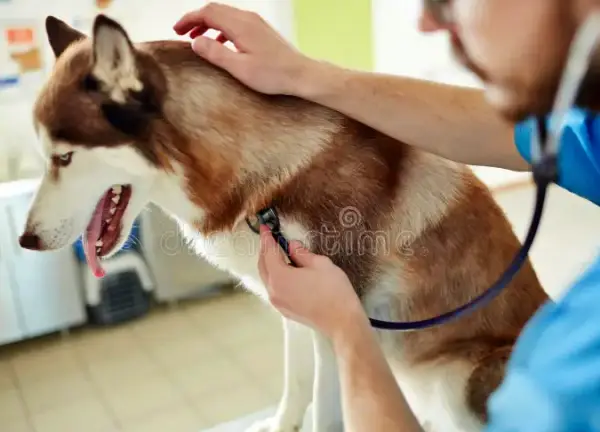
Huskies are known for their strange looks, high energy, and friendly demeanor. Originally bred as sled dogs, these athletic canines thrive in active environments and are best suited to owners who can meet their high exercise needs. However, as with all breeds, Huskies are prone to certain health issues that can affect their quality of life if not properly managed. This article explores the most common health issues faced by Huskies and offers practical tips for preventing and managing these conditions, ensuring your Husky stays healthy and happy.
Hip Dysplasia of Husky Health
Huskies are not as prone to hip dysplasia as larger breeds, but it is still a concern.

Breeder Selection: Choose reputable breeders who test their breeding stock for hip dysplasia. Look for certification from organizations like the Orthopedic Foundation for Animals (OFA).
Healthy Weight: Maintain a healthy weight for your Husky to reduce stress on the joints. Obesity can exacerbate joint problems. Exercise: Provide regular, low-impact exercise, such as swimming or walking, to strengthen the muscles around the hip joint. Avoid immoderate jumping or arduous activities that can put gratuitous stress on the hips. Supplements: Consider joint supplements, such as glucosamine and chondroitin, which can help maintain joint health.
Exercise and Mental Stimulation Of Health
Huskies are high-energy dogs that need plenty of physical and mental stimulation to prevent boredom and destructive behavior.
Tips for Exercise and Mental Stimulation:
Daily Walks: Make sure your Husky gets at least 1-2 hours of exercise per day.
Interactive Toys: Provide puzzle toys and activities that challenge their minds.

Training and Socialization: Engage your Husky in training sessions and socialization to keep their minds active and their behavior good.
Eye Conditions
Huskies are susceptible to many eye conditions including cataracts, progressive retinal atrophy (PRA), and corneal dystrophy. These problems can lead to vision impairment or blindness.
Prevention and Management: Regular Eye Exams: Must manage annual eye exams with a veterinary ophthalmologist. Early detection leads to dealing with eye diseases. Breeding Practices: Only breed Huskies that have been screened for genetic eye diseases.
Monitoring for Symptoms: Watch for signs such as excessive tearing, cloudiness, or changes in the appearance of the eyes. Prompt veterinary attention can prevent conditions from worsening.
Preventive Measures: Protect your Husky’s eyes by avoiding environments with excessive dust or debris during outdoor activities.
Skin Problems
Huskies are known for their thick double coats, which help protect them in cold weather but can lead to skin problems, including allergies and hot spots.
Prevention and Management: Regular Grooming: Brush your Husky’s coat regularly to remove loose fur and prevent matting. Diet and Nutrition: Provide a balanced diet rich in omega-3 and omega-6 fatty acids to promote healthy skin and coat.
Flea and Tick Control: Implement flea and tick prevention year-round. These pests can cause acute skin irritation and allergic reactions.
Environmental Factors: Avoid exposing Husky to allergens such as pollen, mold, and household chemicals.
Zinc Deficiency (Zinc Responsive Dermatosis)
Zinc insufficiency is a condition that can lead to hair loss, breakable skin, and infections. Huskies genetically predisposed to this problem.
Prevention and Management: If your Husky diagnosed with zinc deficiency, your vet may recommend zinc supplements.
High-Quality Diet: Make sure your Husky is on a high-quality diet that meets their nutritional needs. Some commercial dog foods may be deficient in zinc.
Monitoring: Regularly check signs of hair loss, such as hair loss around the face, ears, and joints. Early intervention is key to preventing serious skin problems.
Gastric Torsion (Bloat)
Bloat is a life-intimidating condition where the stomach fills with gas and twists. Although it is more common in deep chested breeds, Huskies not immune.
Prevention and Management:
Feeding Routine: Feed your Husky smaller, more frequent meals rather than one large meal. Avoid strenuous exercise immediately after eating.
Slow Feeding: Use slow-feed bowls to reduce the risk of gas during feeding.
Water Intake: Limit water intake immediately after meals and make sure your Husky doesn’t drink too much at once.
Know the Symptoms: Signs of bloat include restlessness, lethargy, and a distended abdomen. Seek emergency veterinary care if you suspect bloat.
Hypothyroidism
Hypothyroidism occurs when the thyroid gland does not produce enough hormones, leading to weight gain, lethargy, and skin problems.
Prevention and Management:
Regular Checkups: Annual veterinary exams can help detect hypothyroidism early through blood tests.
Medication: If diagnosed, hypothyroidism managed with daily medications to restore normal hormone levels.
Diet and Exercise: Make sure your Husky maintains a healthy weight through diet and regular exercise, which can help manage symptoms.
Autoimmune Disorders
Huskies are prone to autoimmune disorders such as autoimmune skin diseases and lupus. These conditions can cause inflammation and other health problems.
Prevention and Management:
Early Detection: Regular vet visits and prompt attention to symptoms such as excessive shedding, sores, or lethargy are essential.
Medication: Autoimmune disorders often treated with immunosuppressive or antinflammatory medications.
Dental Health
Dental disease is a common problem in Huskies, which if left untreated can lead to bad breath, tooth decay, and systemic infections.
Prevention and Management:
Regular Brushing: Brush your Husky’s teeth several times a week using a dog-specific toothpaste.
Dental Chews: Offer dental chews and toys that help clean teeth and massage gums.
Vet Cleaning: Schedule professional dental cleanings as recommended by your vet.
Husky care includes dedication to their physical health and emotional well-being. By being proactive about common health concerns and maintaining regular veterinary care, you can ensure that your Husky enjoys a long, healthy, and active life. Remember, a healthy Husky is a happy Husky, and the effort you put into their care will be rewarded with years of companionship and adventure.